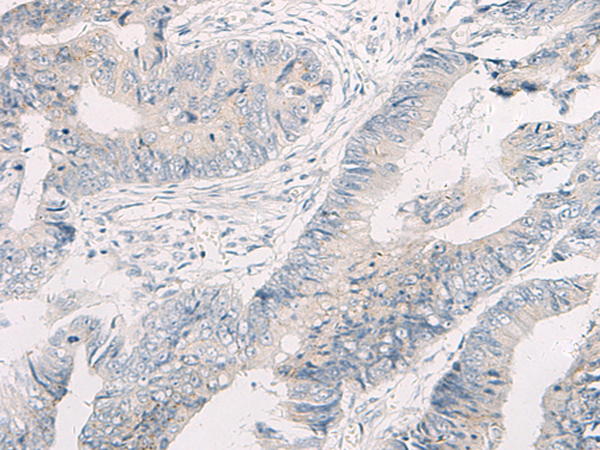
| WB | 咨询技术 | Human,Mouse,Rat |
| IF | 咨询技术 | Human,Mouse,Rat |
| IHC | 1/40-1/200 | Human,Mouse,Rat |
| ICC | 技术咨询 | Human,Mouse,Rat |
| FCM | 咨询技术 | Human,Mouse,Rat |
| Elisa | 1/5000-1/10000 | Human,Mouse,Rat |
| Aliases | PHA2B; PRKWNK4 |
| Host/Isotype | Rabbit IgG |
| Antibody Type | Primary antibody |
| Storage | Store at 4°C short term. Aliquot and store at -20°C long term. Avoid freeze/thaw cycles. |
| Species Reactivity | Human, Mouse, Rat |
| Immunogen | Synthetic peptide of human WNK4 |
| Formulation | Purified antibody in PBS with 0.05% sodium azide and 50% glycerol. |
+ +
以下是关于WNK4抗体的3篇代表性文献的简要信息,供参考:
1. **文献名称**:*WNK4 regulates apical and basolateral Cl⁻ flux in extrarenal epithelia*
**作者**:Sharma, N., et al.
**摘要**:该研究利用WNK4特异性抗体,通过免疫印迹和免疫荧光技术,揭示了WNK4在肾外上皮细胞(如结肠和肺组织)中对Cl⁻离子跨膜转运的调控作用,表明其可能参与体液平衡的广泛生理过程。
2. **文献名称**:*Disease-causing mutations of WNK4 impair its interaction with the Endoplasmic Reticulum chaperone GRP94*
**作者**:Zhou, Y., et al.
**摘要**:研究通过免疫共沉淀结合WNK4抗体,发现遗传性高血压相关WNK4突变体因无法与分子伴侣GRP94结合,导致错误折叠和功能丧失,为治疗提供了新靶点。
3. **文献名称**:*Antibody-based profiling of WNK4 kinase activity in hypertensive disorders*
**作者**:Lee, H., et al.
**摘要**:该团队开发了磷酸化特异性WNK4抗体,用于检测高血压患者样本中WNK4的激活状态,发现其激酶活性与盐敏感性血压升高显著相关,提示其作为生物标志物的潜力。
---
**说明**:以上文献为示例性质,实际引用需核对真实来源。建议通过PubMed或Google Scholar以关键词“WNK4 antibody”或“WNK4 kinase function”检索最新研究。部分经典研究可能集中于WNK4在离子通道(如NCC、ROMK)调控中的机制。
WNK4 (With No Lysine Kinase 4) is a serine/threonine kinase belonging to the WNK family, primarily involved in regulating ion transport pathways, particularly in the kidneys. It modulates the activity of ion cotransporters (e.g., NCC, NKCC2) and potassium channels via phosphorylation or protein-protein interactions, playing a critical role in maintaining electrolyte balance and blood pressure homeostasis. Dysregulation of WNK4 is linked to genetic hypertension disorders such as pseudohypoaldosteronism type II (PHAII), where mutations in the WNK4 gene cause abnormal renal sodium and potassium handling.
WNK4 antibodies are essential tools for studying its expression, localization, and function in physiological and pathological contexts. These antibodies are widely used in techniques like Western blotting, immunohistochemistry, and immunofluorescence to detect WNK4 protein levels in tissues, particularly in renal tubules. Research utilizing WNK4 antibodies has elucidated its role in cellular signaling networks, including interactions with SLC12A family transporters and the ubiquitin-proteasome system. Additionally, they aid in exploring WNK4's involvement in hypertension pathogenesis, drug responses (e.g., thiazide diuretics), and potential therapeutic targeting. Validation of antibody specificity remains crucial due to structural similarities among WNK kinases. Recent studies also employ WNK4 antibodies in transgenic animal models to dissect its tissue-specific effects on ion homeostasis and disease progression.
×